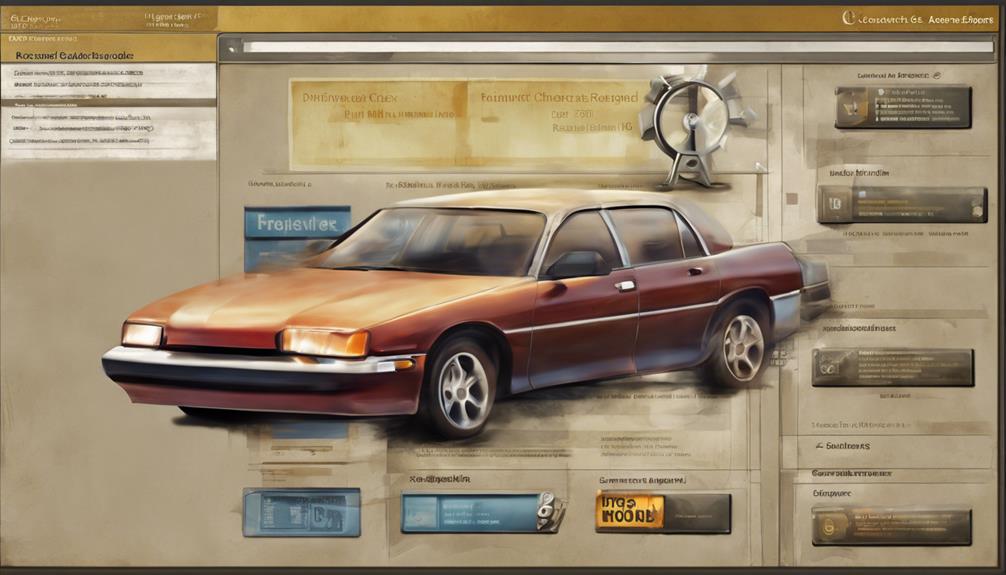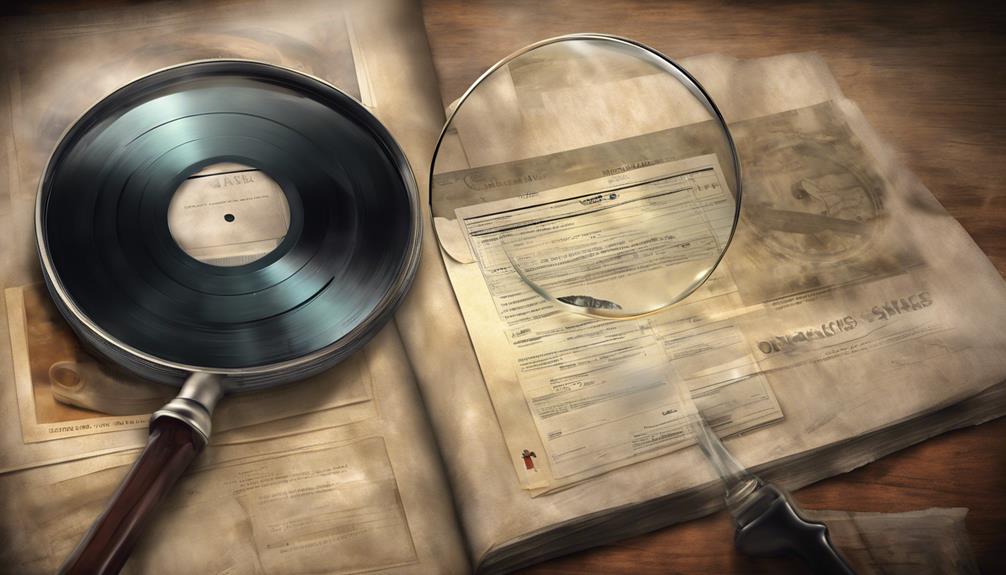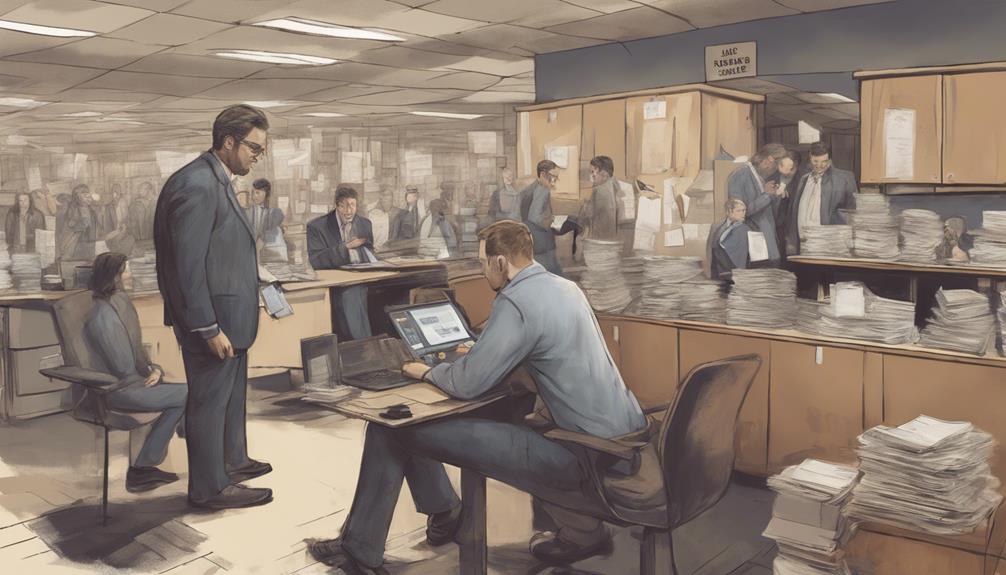Background checks do include driving records, offering employers essential details on a candidate's driving history and safety. These records shed light on important factors like license status, violations, accidents, and DUIs. For roles needing driving, this information is critical. There are various types of records available in Texas, each containing different levels of detail. Employers often emphasize checking driving records to assess eligibility and guarantee compliance. This initial information can influence important decisions regarding hiring suitability.
Key Takeaways
- Driving records are commonly included in background checks in Texas.
- Employers prioritize assessing candidates' driving history and safety records.
- Driving records reveal license status, violations, accidents, and DUIs.
- Look-back periods in Texas for driving records typically range from 3 to 7 years.
- Employers use driving records to make informed decisions for safety and compliance.
Texas Background Check Overview

Employers in Texas commonly integrate driving records into their background checks to evaluate candidates' suitability for roles involving driving responsibilities.
When conducting background screenings, employers in Texas prioritize evaluating candidates' driving history and safety records, especially for positions requiring a valid driver's license.
The Texas Department of Public Safety plays a vital role in managing driving records to guarantee accuracy and compliance with state regulations.
Content of Texas Background Checks
Texas background checks include detailed driving records obtained from the Texas Department of Public Safety (DPS). These driving records reveal important information such as license status, violations, accidents, and DUIs.
Employers often request specific types of driving records, categorized as Type 1, Type 2, or Type 3 records, to gain insights into a candidate's driving history. Type 1 records provide a 3-year history, Type 2 records offer a 7-year history, and Type 3 records present a complete driving record.
Understanding an individual's driving record is essential for evaluating their eligibility for roles that involve driving responsibilities. By accessing these records, employers can make informed decisions to secure workplace, customer, and public safety, particularly for employees who operate company vehicles.
Driving records obtained through Texas background checks play a significant role in determining the suitability of candidates for positions requiring safe and responsible driving practices.
Timeframes for Texas Background Checks

Employers in Texas must consider various factors when conducting background checks, including the timelines for completion, the look-back periods for driving records, and the coverage needed for specific job roles.
Understanding these timeframes is essential for evaluating candidates' eligibility for positions that involve driving responsibilities.
Check Completion Timelines
Typically, driving record checks in Texas yield results for employers within a few days, providing valuable insight into candidates' driving histories. Employers seeking to evaluate applicants for positions involving driving responsibilities often incorporate driving records as part of thorough background checks in Texas.
The completion time for obtaining driving records can vary based on the method of request, such as online or by mail, and the responsiveness of the issuing agency. Accessing driving records promptly is vital for employers to assess a candidate's suitability and verify they meet the necessary requirements for roles that involve driving responsibilities.
- Employers can request driving records as part of detailed background checks.
- Timelines for obtaining driving records vary based on the method of request and the issuing agency's responsiveness.
- Driving records provide essential details like license status, violations, accidents, and DUIs.
- Accessing driving records promptly is important for evaluating candidates' driving histories for roles involving driving responsibilities.
Record Look-Back Periods
In some cases, driving record look-back periods for background checks in Texas may span from three to seven years. Employers conducting driving record checks must consider the specific look-back period required based on the type of driving history report they request.
For instance, Type 2 driving record checks typically cover a 3-year history, while Type 3 reports provide a detailed record. Industries like commercial driving positions often mandate longer look-back periods, such as seven years, to thoroughly assess safety and risk factors associated with a candidate's driving behavior.
Understanding these look-back periods is crucial for employers when evaluating individuals for roles that involve driving responsibilities. By scrutinizing an applicant's driving record within the appropriate timeframe, employers can make informed decisions regarding the individual's suitability for positions where driving is a significant aspect.
Coverage for Employment
When evaluating driving record look-back periods for background checks in Texas, the coverage for employment typically spans the past 7 years of a candidate's driving history. Employers conduct these checks to gather information on traffic violations, accidents, DUIs, license suspensions, and other driving-related incidents that may impact a candidate's suitability for positions involving driving company vehicles or operating machinery.
Employers often request driving record checks for positions involving driving responsibilities.
The look-back period for driving records in Texas background checks is commonly limited to the past 7 years.
These checks may reveal a candidate's history of traffic violations, accidents, DUIs, or license suspensions.
Out-of-state driving records may not be included in Texas background checks unless specifically requested by the employer.
Texas Background Check Laws
Employers in Texas must obtain written consent before accessing an individual's driving record for background checks. Texas doesn't have specific laws restricting the use of driving records in employment decisions, but the state requires written consent to access such information.
To comply with Texas background check laws, employers must handle driving record information securely. The protection and disclosure of personal information in driving records are governed by the Drivers Privacy Protection Act and the Motor Vehicle Records Disclosure Act.
Under certain conditions, employers, contractors, nonprofits, and religious institutions can access driving records in Texas. It's essential for entities accessing driving records for background checks in Texas to adhere to these laws and regulations to safeguard the protection of individuals' personal information and privacy.
County Resources for Background Checks in Texas

County resources in Texas provide valuable access to public information and records for conducting background checks. When it comes to background checks in Texas, individuals and employers can benefit from the specific county resources available. These resources vary in the types of records accessible and the populations they serve, aiding in the screening process effectively.
Here are some key points regarding county resources for background checks in Texas:
- Diverse Information: Different Texas counties offer a range of information for background checks.
- Record Accessibility: County resources provide details on how to access public records for background checks.
- Population Served: The populations served by each county resource can impact the available information for background checks.
- Specialized Records: Notable features of specific county resources include the types of records, such as driving records, that can be obtained for background checks.
Texas MVR Overview and Types of Records
Texas MVR records in Texas offer a thorough overview of an individual's driving history and safety records. Employers can access six different types of Texas MVR records, each providing specific details on driving violations, accidents, and license status.
Understanding the various types of Texas MVR records is essential for employers evaluating candidates for positions that involve driving responsibilities.
Texas MVR Types
Among the various types of driving records available in Texas, the Texas MVR system offers different categories that provide distinct information about an individual's driving history. Employers often request specific Texas MVR types from the Texas Department of Public Safety (DPS) to assess a candidate's driving record for safety and job eligibility.
Understanding the nuances of each type can help make informed decisions when evaluating candidates for driving-related positions. The Texas MVR types include:
- Type 1 (status record): Basic license status information.
- Type 2 (3-year history): Details of driving history over the past three years.
- Type 3 (all accidents and violations): Detailed information on accidents and violations.
- Type 2A (certified Type 2) and Type 3A (certified Type 3): Certified versions of Type 2 and Type 3 reports, often required for official purposes.
Access to these records is facilitated through the Texas DPS website, providing a valuable resource for employers seeking to review an individual's driving record.
Record Access Methods
Employers can easily view Texas driving records through the Texas Department of Public Safety (DPS) to evaluate candidates' driving behavior and safety records. Texas DPS maintains driving records for Texas license holders, providing insights into the candidate's driving history within the state, including any DUI-related incidents.
Different types of Texas MVR records, such as Type 1, Type 2, and Type 3, offer varying levels of information. Type 1 may only include basic license status details, while Type 3 provides a detailed view of the candidate's driving behavior, safety record, accidents, and violations.
Texas MVR Restrictions and Obtaining Records

When it comes to accessing Texas driving records, individuals can obtain different types depending on their needs and restrictions in place. Here are some significant points concerning Texas MVR restrictions and obtaining records:
- Type 3 and 3A Texas driving records are only accessible to the license holder.
- Employers can request Type 1, 2, 2A, or AR driving records through Form DR-1.
- FCRA limits the look-back period to seven years for MVR checks conducted by Consumer Reporting Agencies (CRAs).
- Texas DPS, along with other state agencies, maintains and provides access to driving records.
Individuals can order their own Texas driving records online through the Texas DPS website or by mail. It's important to be mindful of these restrictions and procedures when seeking to obtain driving records in Texas.
Importance of Texas MVR Checks
Individuals seeking to understand the significance of Texas MVR checks can gain valuable insights into candidates' driving history and safety records. Employers conduct these checks to evaluate a candidate's suitability for regulated driving roles, confirming they meet safety standards and comply with regulations.
Commercial drivers, in particular, undergo pre-employment and annual employee MVR checks to uphold safety in their roles. Rideshare services also rely on Texas MVR checks to maintain the safety and reliability of their services. Additionally, these checks help minimize risk, reduce liability, and lower insurance premiums associated with hiring safe drivers.
Frequently Asked Questions
What Does a Background Check Show in Texas?
In Texas, a background check provides employers with a thorough view of a candidate's history, including driving records from the Texas Department of Public Safety. This information aids in evaluating suitability for roles involving driving responsibilities.
Do Speeding Tickets Show up on Background Checks in Texas?
Speeding tickets in Texas can appear on background checks if they resulted in convictions or are part of the driver's record. Employers checking driving history may see speeding tickets if they led to fines or points.
What Is a Red Flag on a Background Check?
A red flag on a background check signifies a potential issue or concern that may impact a person's suitability for a particular role or responsibility. This could include criminal records, employment gaps, or inconsistencies.
What Background Check Do Most Employers Use?
Employers commonly use Motor Vehicle Report (MVR) background checks to assess candidates' driving histories for roles involving vehicle operation. MVR checks reveal license status, traffic violations, accidents, DUI convictions, and other driving offenses to guarantee safety and compliance.
Conclusion
To sum up, Texas background checks are like a window into a person's soul, revealing their past and potential future.
With detailed information on driving records included in these checks, employers can make informed decisions about who they hire.
So, don't underestimate the power of a background check in Texas – it's like having x-ray vision into someone's life!









